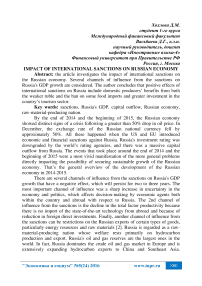Impact of international sanctions on Russian economy
Автор: Хохлова Д.М.
Журнал: Экономика и социум @ekonomika-socium
Статья в выпуске: 5-2 (24), 2016 года.
Бесплатный доступ
The article investigates the impact of international sanctions on the Russian economy. Several channels of influence from the sanctions on Russia's GDP growth are considered. The author concludes that positive effects of international sanctions on Russia include domestic producers’ benefits from both the weaker ruble and the ban on some food imports and greater investment in the country’s tourism sector.
Sanctions, russia''s gdp, capital outflow, russian economy, raw-material-producing nation
Короткий адрес: https://sciup.org/140120047
IDR: 140120047
Текст научной статьи Impact of international sanctions on Russian economy
By the end of 2014 and the beginning of 2015, the Russian economy showed distinct signs of a crisis following a greater than 50% drop in oil price. In December, the exchange rate of the Russian national currency fell by approximately 50%. All these happened when the US and EU introduced economic and financial sanctions against Russia. Russia's investment rating was downgraded by the world’s rating agencies, and there was a massive capital outflow from Russia. The events that took place around the end of 2014 and the beginning of 2015 were a most vivid manifestation of the more general problems directly impacting the possibility of securing sustainable growth of the Russian economy. That’s the general overview of the development of the Russian economy in 2014-2015.
There are several channels of influence from the sanctions on Russia's GDP growth that have a negative effect, which will persist for two to three years. The most important channel of influence was a sharp increase in uncertainty in the economy and politics, which affects decision-making by economic agents both within the country and abroad with respect to Russia. The 2nd channel of influence from the sanctions is the decline in the total factor productivity because there is no import of the state-of-the-art technology from abroad and because of reduction in foreign direct investments. Finally, another channel of influence from the sanctions can be restrictions on the Russian exports of certain types of goods, particularly energy resources and raw materials [2]. Russia is regarded as a rawmaterial-producing nation whose welfare rests primarily on hydrocarbon production and export. Russia's oil and gas reserves are the largest ones in the world. In fact, Russia dominates the crude oil and gas market in Europe and is extensively expanding hydrocarbon exports to China and Southeast Asia.
However, it can be stated that the oil and gas sector is no longer the key driver of the Russian economic growth.
We can see that the only two sanctions that matter are the ban on Russian banks, and, from the Russian side, the ban on some imported food. Without international sanctions the economy would be in recession because of the oil price collapse. If prices for oil had not gone down, the sanctions alone would not have caused the recession. The ruble would not have fallen in mid-December if the oil price had been above $100 bpd.
As for consequences of sanctions on Russia, the country has a new slogan "import substitution.” Domestic producers have benefited from both the weaker ruble and the ban on some food imports since last year. However, it’s important to highlight one more positive effect of sanctions such as the fact that more Russians will have their holidays in domestic resorts, which results in greater investment in the country’s tourism sector [1].
Список литературы Impact of international sanctions on Russian economy
- http://entornointeligente.com/articulo/6411108/How-Much-H.Hurt-Russia-08072015
- http://newcoldwar.org/how-much-have-sanctions-really-hurt-russia/


